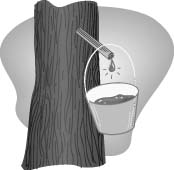
Maple syrup producers (sugarbush operators) in the Rochester region are reporting the start of tapping as of February 22. Sugarbush operators are tapping trees as much as 10 days ahead of average due to the current weather pattern of freezing temperatures at night and above freezing temperatures for at least an eight-hour period during the day which provides ideal conditions for sap flow, according to Bob King, Cornell Cooperative Extension. A major sap run can last as long as six weeks. Despite above average temperatures during January, the maple syrup season appears to be on a normal track. "The maple producers really needed this bout of cold weather and snow, hopefully this will be the maple season's saving grace, as January was way too warm," Debbie Day, Maple Grove Farm of Clarendon, said. "We tapped just before this cold snap hit so we will be ready for production as soon as we start getting the thawing days and freezing nights. According to the long range forecast it looks like after March 7 the weather will start to cooperate." Although, there are scant reports by homeowners of maple trees with bud swell in urban areas, a large majority of sugarbush operators are reporting little if any impact to maple trees from January's above average temperatures. Most sugarbush operations are located in areas of higher elevations and did not experience temperatures that would impact the physiology of the trees which tend to be more influenced when the sun becomes higher in the sky which contributes to additional radiant heat as a result of extended and more direct sunshine. Sap at the beginning of the season is water white, clear and transparent. It is sweet with no odor. During bud swell, the sap turns in to "buddy" sap. Buddy sap has an unpleasant odor and is due to a significant physiological change in the tree; it is not due to microbial activity. Buddy sap is not desirable for use and signals the end of the season. "As in any maple season we are at the mercy of Mother Nature and are never quite sure what kind of season it will be until it is over. However, I anticipate that we will make some nice syrup again this year," Day said. This year's maple syrup crop will likely feel the effects of the past summer's dry and hot spell and our current below average snow fall and lack of snow pack. Prolonged hot and dry weather during the summer, may have impacted this year's syrup production by reducing the amount of sugar that a maple tree produces and stores. Consequently, sap flows may experience lower concentrations of sugar which may cause some sugarbush operators to boil sap longer in order to make syrup. In addition, snow fall and snow pack help moderate soil temperature and provide a steady release of water, which are key determinants in both the quality and quantity of sap flow. Maple weekend this year will be March 18 and 19 from 10 a.m. to 4 p.m. For information go to www.mapleweekend.com. March 5, 2006 |
